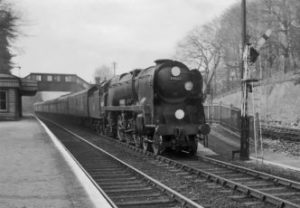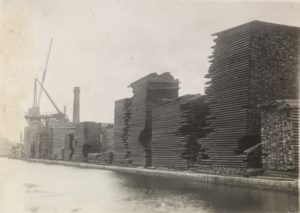John Edmonds (1911-1984): Life and Labour (Part One)

Whilst many working-class autobiographers write centrally about the struggles of working life, talk of labour is ominously absent in John Edmonds’ memoir, ‘The Lean Years’. For some writers, such as Frank Prevett (b. 1904), work was central to their lives. Frank recounts his early career in numerous jobs, such as in his uncle’s butchers shop and in a local grocery store. His memoir, however, is titled ‘Memoirs of a Railwayman’ which demonstrates how many members of the working-class ultimately came to be defined by their occupation. Frank would hold various positions in the railway industry before going on to dedicating his entire life to it. For someone who had originally held no interest in the railways, they had become a huge part of his life. This is an example of how work can become something to be proud of for working people with little material wealth. For others, work represented the cruel reality that they were deemed unequal and subordinate to others, merely for being born into the wrong economic class. Charles Shaw recites the gut-wrenching moment he felt condemned by labour, claiming a ‘sudden, strange sense of wretchedness’ (Quoted in Burnett, 1984, 130). Charles, only eight years old at the time, had seen a boy his age with the time to read for pleasure. This was the first time that he recognised that ‘my lot was harsher than his and that for others’ (Shaw quoted in Burnett, 1984, 130). Sensing the first scourge of the unfairness work can bring, Charles ‘went back to my mould-running and hot stove with my first anguish in my heart’ (Shaw quoted in Burnett, 1984, 130).

Whilst it is evident that work plays a pivotal role in working-class lives, John does not mention any occupation he held in his adult life throughout the entirety of his memoir. He does, however, reveal that he worked as a part-time newsboy as an adolescent. John knew of the importance of money, and aimed to help his struggling mother and father. This is an earnest attitude instilled within the entire family, as ‘as the earning power of my two brothers advanced’ (24), the family were able to live without sub-letting the rooms of the house. It is encouraging to see that whilst their father found employment difficult, the earnings of the Edmonds children would contribute foremost to the benefit of the family in a collective effort to live better lives. Conscious of this, John proudly recollects that he ‘had developed some skill in the acquisition [sic] of money by the time of my fourteenth birthday’ (85). Already enjoying a fruitful social life full of games and playing, and a dedicated student with Sunday school and church on the Sabbath, John dedicated his Saturdays to trying to earn money for his family. Whilst he rejected the onus many families placed upon earning, he knew of its importance and wished to help. An enterprising boy with his wits about him, he would buy newspapers ‘from the distributors [sic] van at the rate of three for twopence’ (85) and then sell them on ‘at a penny each’ (85). John was well-versed in thinking outside the box and found great success ‘by crying them in the street away from the recognised rounds of regular newsboys who were employed by newsagents’ (85). Many of these “regular newsboys” were acquaintances from school. John was conscious of being able to trade in the less-populated areas ‘without loss of honour’ (85): taking the custom of his schoolmates. In this, John demonstrates his awareness of classroom politics, popularity, and diplomacy, as well as a cunning display of stealth. He successfully subverted the practice to his will so that he could achieve what was most essential: money in a time of dire economic need.

John had other ways of earning money. ‘Another means of obtaining funds was the conversion of driftwood taken [from] the Grand Surrey Canal, to kindling wood’ (85). By doing this, John generated funds from very little. Whilst it shows the desperation of the working class to repurpose waste wood for profit, it also shows temerity, invention, and success, with the practice being ‘very profitable despite a limited market’ (85). John notes other ways of ‘turning an honest copper or two’ (85). His phrasing indicates a pride in earning for one’s self, congruent with a general feeling of dignity in the working class. In Virginia Thomas and Margarita Azmitia’s study, an Asian American working-class man spoke of his earning capacity that: ‘I feel proud that I’ve earned what I have […] My family is not as wealthy as a lot of my friends’ families but I don’t feel any less proud of my family’ (2014, 205). For members of the working class, they do not see economic viability as a determining factor in worth. Instead, for their disadvantages, they are proud that they have the integrity to overcome them. John remarks that selling and collecting scrap iron was ‘the hardest work and lowest paid of all’ (85), yet this is not used as an excuse. It is presented, rather, as a badge of honour – a testament to getting one’s hands dirty in the toughest conditions to preserve the family.
In Life and Labour (Part Two), I will examine the state of employment in Bermondsey in the “Lean Years”, discuss John’s father’s struggles with employment, and look at his Aunt Ada’s work, done from within the Edmonds family home.
Bibliography
2.237 EDMONDS, John, ‘The Lean Years’, MS, pp.89 + 3pp. list of illustrations (c.18,000 words). BruneI University Library.
2:638 PREVETT, Frank. ‘Memoirs of a Railwayman’, Burnett Archive of Working Class Autobiographies, University of Brunel Library, Special Collection.
Burnett, John, ed. Destiny Obscure. Harmondsworth: Penguin. 1984.
Coupar, James (). ‘Frank Prevett (b.1904) Life and Labour Part One.’ Writing Lives. /life-and-labour/frank-prevett-b-1904-life-and-labour-part-one Web. Accessed 17 April 2018.
Shaw, Charles. When I Was a Child. 1903. Leek: Churnet Valley Books, 1998.
Thomas, Virginia and Margarita Azmitia. ‘Does Class Matter? The Centrality and Meaning of Social Class Identity in Emerging Adulthood.’ Identity: An International Journey of Theory and Research 14.3 (2014): 195-213.
Images
Piles of timber at Glengall Wharf –
Woldingham Station, Surrey –
Workers on the Grand Surrey Canal –

Leave a Reply